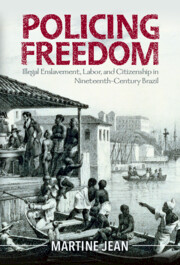Book contents
- Policing Freedom
- Afro-Latin America
- Policing Freedom
- Copyright page
- Dedication
- Contents
- Figures
- Maps
- Tables
- Acknowledgments
- Introduction
- 1 The Politics of Slavery, Race, Nation, and Prison Building
- 2 Confinement, Labor, and Citizenship
- 3 Prison Labor and the Politics of Slavery
- 4 Disciplining Children and Engendering Racialized Citizenship
- 5 Adelino Mwissicongo and the Afterlife of Emancipation
- Conclusion: Slavery’s Punitive Afterlife
- Appendices
- Bibliography
- Index
1 - The Politics of Slavery, Race, Nation, and Prison Building
Published online by Cambridge University Press: 03 August 2023
- Policing Freedom
- Afro-Latin America
- Policing Freedom
- Copyright page
- Dedication
- Contents
- Figures
- Maps
- Tables
- Acknowledgments
- Introduction
- 1 The Politics of Slavery, Race, Nation, and Prison Building
- 2 Confinement, Labor, and Citizenship
- 3 Prison Labor and the Politics of Slavery
- 4 Disciplining Children and Engendering Racialized Citizenship
- 5 Adelino Mwissicongo and the Afterlife of Emancipation
- Conclusion: Slavery’s Punitive Afterlife
- Appendices
- Bibliography
- Index
Summary
This chapter explores how postcolonial reformers attempted to reconcile Brazil’s dependence on slavery and the slave trade within a nation-building project that emphasized it as an empire of law, order, and liberal citizenship. It discusses Brazil’s transition from a colony to a postcolonial nation, and analyzes the antislavery ideas that informed the building of the penitentiary in Rio as a crucible for modernizing the empire. By 1831, these postcolonial reformers converged around a philanthropic organization called the Sociedade Defensora da Liberdade e Independencia Nacional, whose objective was to modernize Brazil’s institution from colony to nation. The organization targeted abolition of the slave trade to Brazil and reform of its criminal justice system as two of its main objectives to anchor the empire on the path to progress, order, and economic prosperity. Analyzing the postcolonial debates on the abolition of the slave trade, legal reforms, and citizenship demonstrates that they were fundamental to the adoption of the penitentiary. Social reformers and antislavery advocates viewed the prohibition of the traffic as significant in resolving debates about race, nation, and citizenship in postindependence Brazil.
Keywords
- Type
- Chapter
- Information
- Policing FreedomIllegal Enslavement, Labor, and Citizenship in Nineteenth-Century Brazil, pp. 48 - 105Publisher: Cambridge University PressPrint publication year: 2023



